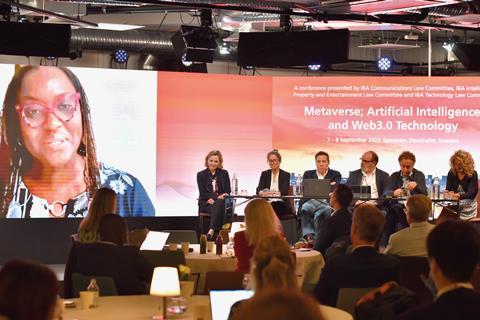The Metaverse has arrived, but as a place to do business it will be fraught with uncertainty until key legal questions are resolved. Michael Cross reports
The low down
Electronic drugs, city hall, law firm office – or simply a more pleasant alternative to real life? These are some of the applications already mooted for the immersive Metaverse virtual world, widely hyped as the next big thing in cyberspace. Whatever the eventual use of the Metaverse turns out to be, it will raise legal questions in areas ranging from intellectual property to data protection to competition law. Not to mention bullying by avatars. Who is going to resolve these questions? Legal experts from around the (real) world met in Stockholm this month to work out some answers.
Why, one attendee asked, did the International Bar Association decide to hold its first major conference on the Metaverse in person rather than in the Metaverse itself? ‘We considered that,’ an organiser said. The conclusion, it seems, was that assembling the computer power and technical hardware required to create a fully immersive virtual experience for 100 or so experts in communications, IP and technology law would be greater than that of them all convening in Stockholm for a couple of days.
So, right at the outset attendees had an insight into one of the major challenges thrown up by the internet’s Next Big Thing. There would be plenty more: technical, ethical – and, of course, legal.
But first, what is the Metaverse? And why should it interest lawyers?
The term first appeared at the dawn of the web age, in a 1992 cyberpunk novel Snow Crash. On page 22 we learn that Hiro Protagonist, who has just lost his job delivering pizzas for the Mafia in a dystopian 21st century California, is physically at home in the ‘U-Stor-It’ container he shares with a heavy metal guitarist. Mentally, however, ‘he’s in a computer-generated universe that his computer is drawing onto his goggles and pumping into his earphones. In the lingo, this imaginary place is known as the Metaverse’.
In this Metaverse, people interact with each other – sometimes murderously – through their digital representations, or avatars, in an almost unlimited immersive landscape. ‘Hiro spends a lot of time in the Metaverse,’ author Neal Stephenson tells us. ‘It beats the shit out of U-Stor-It.’
Stephenson was prescient, as anyone with teenage children will know. Virtual universes began to take shape in the 1990s as multiplayer computer games such as Doom, typically played late at night in university computer labs and other venues with state-of-the-art computer networks.
But in 2003 a new type of virtual universe appeared: Second Life had no particular ‘winner’ goal and certainly no killing. Your avatar could travel the universe, interact verbally with others, go to a concert or an art gallery, gamble, dance – or simply pose. Some enthusiasts opened shops selling virtual clothes or art; they were joined by real-life business (including a couple of law firms); a couple of national governments set up Second Life ‘embassies’.
Second Life is still going, but it never grew beyond a cult audience. However in 2021 the wider world sat up when an established tech titan, Facebook founder Mark Zuckerberg, announced that the Metaverse was where the future of the web lies. Facebook’s parent company was renamed ‘Meta Platforms’ and ploughed investment into 3D graphics and other immersive technologies.
The Metaverse had surely arrived: ICT specialist Magda Cocco, a partner at Lisbon firm Vieira de Almeida & Associados, reminded the Stockholm event of last year’s prediction by tech analyst Gartner that, by 2026, a quarter of us would be spending at least an hour a day in the Metaverse.
But doing what, exactly?
One suggestion came, predictably enough, from technomedia hot-house the Republic of Korea. Seoul Metropolitan Government claims to be the first in the world to offer its e-government services in the Metaverse. Appearing remotely, Seoul’s director of digital policy, Kim Jin-man, gave us a walk-through tour of virtual offices. Young, slim avatars greeted us in ‘Tax Square’ and the Fintech Lab. One planned innovation is a virtual real estate contract service for first-time buyers, which could put England and Wales’ feeble steps towards e-conveyancing in the shade.
The original motivation for the Seoul Metropolitan Government Metaverse, built from scratch and launched last year, was the pandemic, Kim said. However he did not volunteer a business case for the project’s continuation, beyond promoting Seoul as a cutting-edge kind of place. In informal comments, conference participants agreed that the Metaverse would be unlikely to appeal to the people who rely most on public services, the elderly or poor.
'We advise on new developments and wanted to take leadership in something that will, at least partly, change the way we interact'
Eric Wagner, Gleiss Lutz
Of greater interest to the audience was a law firm which has set up in the Metaverse. Stuttgart full-service firm Gleiss Lutz opened its office on the Decentraland 3D virtual world platform in July last year. Leading us – in person – on a virtual tour of the office at 42,-45 Decentraland, partner Eric Wagner did not claim that Gleiss Lutz’s clients had suddenly switched to seeking legal advice by avatar. Rather, he said, the idea, which originated in an internal thinktank, was to show that the firm was on top of the technology.
‘We advise on new developments and wanted to take leadership in something that will, at least partly, change the way we interact,’ Wagner said. ‘We are a full-service firm and work in a lot of different fields of law which are to some extent affected by this.’ These include M&A, tax, commercial and litigation, he said.
But Wagner stressed that the Metaverse office is part of a broader campaign of thought leadership. Its first direct use is in recruitment. ‘We wanted to attract young people, young talents,’ Wagner said. ‘We would really like to have people on board who identify with this.’ The firm began by showing the system at conventional job fairs and then moved on to its own job fair in virtual space. The feedback? ‘Very positive,’ he said. ‘Clients are already interested, but of course not for all purposes.’
However the wider use of the Metaverse as a place to do business, negotiate and sign contracts and – as the conference heard – to practise medicine will be fraught with uncertainty until key legal questions are resolved. These apply equally to the conference’s other main themes: artificial intelligence and the blockchain-powered ‘web 3.0’. Issues raised at the event ranged from the status of intellectual property created on the Metaverse – or copied from real life – to the bullying of avatars and the interoperability of different platforms. Data protection is particularly important, especially as anyone using an immersive headset is potentially recording everything that happens around them.
They seem to boil down to the central question of jurisdiction.
Getting to grips with digital
Some of the world’s major economies are still getting to grips with quite basic digital legislation. In Brazil, for example, described by Sofia Kilmar, partner at Sao Paulo firm TozziniFreire, as a society which combines enthusiasm for social media with enthusiasm for litigation, data protection regulation dates only from 2020. ‘We’re still learning about privacy culture,’ Kilmar said. However she predicted that AI legislation could be on the way next year.

Data protection law is an even greater novelty in India, Sajai Singh, partner at Bengaluru firm JSA Advocates & Solicitors, pointed out. The country’s first comprehensive data protection law, the Digital Personal Data Protection Act 2023, was passed only last month. Singh suggested that the whole concept of privacy is alien to ‘community-focused societies’, such as in much of the developing world. ‘That’s why we didn’t see any need to develop a privacy law.’
However a data-protection regime alone is not sufficient to address the challenges posed by the Metaverse, AI and Web 3.0, Teki Akuetteh (pictured) of Accra firm Nsiah Akuetteh & Co warned. Appearing by video from Ghana, she cited the additional burden of regulation when a widely used virtual platform is not even legally resident in the country. Africa has 55 countries, with widely differing legal traditions.
As with the early cyberpunk phase of the worldwide web, part of the Metaverse’s attraction is its apparently anarchic character. The fictional Metaverse in Snow Crash is regulated by a ‘Global Multimedia Protocol Group’, presumably an extrapolation of the Worldwide Web Consortium. In reality, some governments at least are showing an interest.
The IBA conference was held in the runup to the expected passage of the most pressing legislative move, the EU’s AI Act, which is expected to be in force in the first quarter of 2024. The AI Act will introduce a regime analagous to that of the General Data Protection Regulation covering any development based on AI. This very much includes the Metaverse. Meanwhile, in July the European Commission was working on a strategy to ‘ensure an open, secure, trustworthy, fair and inclusive digital environment for EU citizens, businesses and public administrations’.
Given the lack of any significant European player in this market, this approach is likely to meet scepticism. One conference speaker, Joakim Jardenberg of truck-maker Volvo – a big user of virtual reality to train engineers – warned of ‘counterproductive’ EU legislation stifling innovation: ‘Please, hands off!’
In the US, meanwhile, regulation is concentrating on particular components such as the microchip industry rather than the Metaverse as a concept, observed session moderator Sajai Singh, partner at Bengaluru firm JSA Advocates & Solicitors. ‘I don’t think in the US we’re going to see a huge focus on regulating the Metaverse,’ he said.
China, predictably enough, sees the issue through the prism of state security. Its latest move, coming into force last month, is a regulation on generative AI requiring service providers to deliver up algorithms on demand. The conference heard that the so-called Interim Administrative Measures for Generative Artificial Intelligence Services have provision for extra-territorial effect, causing ‘very big concerns’. Metaverse regulation is ‘unlikely to be enabling regulation’, observed Yoshifumi Onodera of Tokyo firm Mori Hamada & Matsumoto.
Japan is actively promoting the Metaverse as a new economic growth area, said Takashi Nakazaki, attorney at Tokyo firm Anderson Mori & Tomotsune. While specific regulation is unlikely, the Ministry of Interior and Communications is looking at areas such as IP and privacy, and the potential for the misuse of 3D data in planning real world crimes, for example. Up to now, Tokyo has embraced a remarkably liberal interpretation of IP rights, including a five-year-old amendment allowing the use of copyright material for training machine-learning AI systems. However the government is under pressure from rights holders to amend the law, Nakazaki said.
As for the UK, the conference’s working assumption was that, for all the government rhetoric about nurturing AI innovation, regulation will end up following the EU lead.
The prospect of widespread human interactions through avatars will raise particular challenges for regulation. What is the relationship between an avatar and a real person? Nakazaki asked. ‘For example, is impersonation of an avatar an offence against the person or not? Does an attack on an avatar constitute an attack on the natural person? We have to continue to discuss these points.’
This could be where Web 3.0 comes in: blockchain-based systems, with their ability to leave an audit trail to enforce binding outcomes, are the obvious solution, Assaf Unger, partner at Tel Aviv firm Horn & Co observed. ‘It will be essential, because in the Metaverse you can change your avatar.’

As recent enforcement actions against tech giants have shown in the EU and – belatedly – the US, questions of competition law are likely to loom large in any attempt to regulate the Metaverse. At the moment, there are still many ‘metaverses’, raising questions of interoperability, among other issues. However Laurence Bary, partner at Dechert Paris, noted that tech giants’ reaction to antitrust varies according to the jurisdiction. When the German authorities ruled against a Google headset, Google simply stopped selling the headset in Germany, she said. When the US ruled on the same issue, it changed its business model. ‘International cooperation is needed,’ she said – perhaps optimistically in the current climate of trade disputes.
Bary also predicted that the current proliferation of metaverses would not be sustainable. ‘In the Metaverse there is a very strong network effect; it is prone to tipping to the point where it doesn’t make sense to have more than one platform. That is worrying competition authorities all over the world.’
Contenders for the title of master of the Metaverse were notably absent from the IBA event. That enabled a strong consensus to emerge on the topic of moderating virtual worlds: that it cannot and must not be left to the platform operators themselves. But given the inherent jurisdictional difficulties, who should step into the space? Who, for example, should decide on ‘grey zone’ issues such as whether a slogan on an avatar’s T-shirt is acceptable?
Philippe Coen, president of RespectZone, a French non-governmental organisation set up to tackle cyber-violence, cyber-harassment and online hate, offered a possible solution. ‘We propose a mutualised outside platform run by an NGO to offer a mediation route to resolve grey violence,’ he said. This would give an alleged victim a route to go to the alleged perpetrator. The goal, he said, should be a ‘respect and diversity by design Metaverse’.
However, all the global efforts at creating a legal framework for the Metaverse are acting in a vacuum until a truly compelling application emerges for the new world. ‘We have a use-case issue,’ Cecile Theard-Jallu of Paris firm De Gaulle Fleurance summed up. Perhaps significantly, two of the most promising case studies presented at the Stockholm conference were in the already hyper-regulated sector of medicine.
One was from Milan start-up Artiness, which is applying virtual-reality technology to the planning of surgery. Recent breakthroughs in medical imaging have made it possible to digitise the human body, chief executive Filippo Piatti said. Wearing virtual reality headsets, surgeons and patients can work together to plan operations on a 3D life-size replica of, say, the patient’s actual heart.
Even more startling was the presentation by Etienne Lepoutre, chief executive of an ‘electronic drug’ company, Paris-based Bliss. Its system immerses patients undergoing, for example, cardiovascular surgery in a compelling 3D environment. The procedure then goes ahead under a local anaesthetic, rather than complete sedation. Clinical trials have shown that 96% patients require no sedative at all, Lepoutre said; the remainder between one- and two-fifths of the correct dose. There are no side-effects and patients can walk out of the operating room, cutting both costs and the risk of infection.
An electronic anaesthetic is a graphic demonstration of the potential power of the Metaverse to immerse – indeed to ‘beat the shit out of reality’, as the hero of Snow Crash might put it. And while it may take another generation, along with significant progress in hardware and software, for the Metaverse to truly take off, it is a safe bet that future ‘killer applications’ will be in areas we cannot conceive of today. With that in mind, it is hard to lay down a foolproof legal regime: but it might be an idea to give those who must do so a place from which to start.
Gleiss Lutz: German firm opened its office on the Decentraland 3D virtual world platform in July last year





































No comments yet